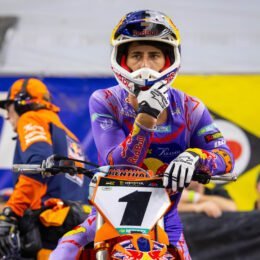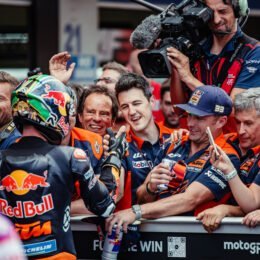The MotoGP™ enabler
How do you get to be a Grand Prix Crew Chief and how complex is the job anyway? Brad Binder’s closest collaborator, Andrés Madrid, tells us the story…

PC: Rob Grey (Polarity Photo)
Brad Binder’s MotoGP pitbox is a hive of characters, nationalities, expertise, and dedication. The 28-year-old sits at the back, in his crook, while the KTM RC16s are fettled in front of him. Wheels are wrapped, swapped and attached, cables fly, tools clank. People almost dance around the small, carpeted space as they work. Binder usually stares into and beyond the panorama; lost somewhere between concentration and focus and thought. When he’s not armed with a clipboard or talking into a microphone to the rest of the group, or staring at a data monitor, Andrés Madrid is conducting proceedings and trying to make the scene move to Binder’s tune.
Brad enters 2024 MotoGP and his tenth season in Red Bull KTM colors, and Madrid has been with him through nine campaigns of this decade spell. From a data engineer in Aki Ajo’s Red Bull KTM Ajo Team in Moto3™, then Crew Chief in Moto2™ and then the same role in the considerably bigger expanses of the MotoGP Factory team since the beginning of 2021. Binder has been 11th, 6th, 6th and 4th in his previous MotoGP terms. Together with Andrés, there is a sense that ’24 could be something even more special.
If there is one fallacy with MotoGP ‘awareness’, then it’s a lack of light on the role that the team play inside and outside the pitbox and the value to the result. There are 22 highly skilled, highly experienced (they have been competing since they were small children), highly motivated and extremely brave athletes on the grid. But behind every single one is a knowledgeable, weathered and diplomatic Crew Chief. For every player, there is a manager. One wouldn’t exist without the other. The Crew Chief is the link, the translator, the pacifier and the problem-solver and the rider’s first touching point with the sporting world beyond the lines of the asphalt.

PC: Rob Grey (Polarity Photo)
So how did a South African and a Spaniard forge such a connection? And how did Madrid make his way up to the point of being a Grand Prix-winning orchestrater?
“I was working in a small national championship around my home town in Valencia while I was at University,” the slight, 37-year-old starts to explain. “I was studying mechanical engineering but I was always a fan of motorsport. I ended up with an opportunity to join an established Grand Prix team from the area and go to the world championship, but I wanted to graduate first. In my last year at University, I had a call from Aki Ajo; it was at the end of 2012 when they had just won the first Moto3 title with Sandro Cortese. I thought ‘wow, OK, this is the time’. I knew it would be tough to study and work but it was just for one year. I didn’t want to be a mechanic and ended up changing my field to design engineering, which is more about ideas. I then wanted to learn more about electronics because I was leaning more towards the data side. After that I studied more electronics and electronic engineering and did a Masters. I was a few years in the University! I did it together with a job at the races.”
Madrid’s combination of intelligence, being part of the paddock community and committing to the demands of racing meant he started to find his place in the Grand Prix establishment. Ironically, he did not see a data role with Ajo and an emerging talent called Brad Binder in 2015 leading one day to being Crew Chief.

PC: Rob Grey (Polarity Photo)
“After we won the Moto3 world championship with Brad in 2016, Aki picked a few of us to go with him to Moto2. Instead of data though he wanted me to be a Crew Chief. My first answer was ‘No’! I had studied a lot of engineering, and my focus was on data and strategy and perhaps one day for MotoGP. I wanted to be a specialist. It wasn’t my goal to ‘manage’ a team. Aki asked again and I resisted. I said ‘Aki, I’m sorry, but this is not my business, and I don’t think it goes with my strengths’ and the third time he said: ‘OK, I’m not asking anymore! You have to do it!’”
Ajo clearly saw something in the way that Madrid exists in the pitbox and in the team dynamic. From that moment in Moto2, Andrés accelerated his education once more. “Among the older Crew Chiefs that we had in the garage – we had Brad and Miguel Oliveira in Moto2 – was Massimo Branchini, who is a legend, and I learned a lot from him. When I started in the Spanish Championship he was working for another Grand Prix team and brand and we ended up sharing a box: I was sitting there in the corner looking at how the team worked and how professional they were. It was two-three steps higher or better than us in the Spanish Championship. I was asking questions and talking and trying to take in everything, like an annoying kid in the background. A few years later I was working alongside him with Aki! For me it was super-nice, and I was still trying to learn as much as I could. I was like a sponge around him. He always had the patience to sit with me and answer all my questions, and at the same time if I could help him with something – because we were both trying to develop a bike – then I did because we had to develop software and I could use my skills with programs and things. I think we were quite a competitive team.”

PC: Rob Grey (Polarity Photo)
Binder won eight Grands Prix in three years and was close to the 2019 title. MotoGP then turned up on the doorstep. After Binder’s rookie season in 2020, Madrid was again in demand for 2021. “Mike Leitner [then Red Bull KTM Team Principal] asked me to go with Brad. Again, I resisted. I said: ‘Mike, there’s no way! It is too much. I’ve never worked in MotoGP so how can I handle this?!’ It was another level: two bikes, a much bigger crew, the tires, brakes and electronics were different. They needed someone with experience. He told me a few stories of his own start in the deep end with another factory and it gave me some confidence. At least nobody could say I was over-confident! I was very honest from the beginning, and Mike still thought I could do it. When someone has a lot more experience than me then I really listen to what they have to say. I thought if ‘Mike Leitner is telling me this…then I trust him’.”
“When I arrived in the MotoGP box, I realized the rest of the guys were a few steps in front of me. I would ask them if they’d sorted something: ‘done’. Then if they had checked something else: ‘done’. It was incredible. The experience was almost overwhelming, and I knew working like that and being surrounded by a crew like this made my life super-easy. They are experts.”

PC: Rob Grey (Polarity Photo)
Madrid had a grasp of the technical realm but dealing directly with riders, personalities and pressures and taking on responsibilities was another ball game. “I soon realized that my job is dependent on the results and only the results. Even if you think you are doing things right and the team is good, but the results don’t come then you are in ‘danger’. It’s like this. Life does get more complicated. You feel it on your shoulders, and you cannot compare it to any other position in this sport. You get used to it in a way and over time, but I have to say that every night when you go to bed you carry some of it with you, and it can make for difficult nights; and this doesn’t get any better. I don’t know how it is for the other Crew Chiefs but you can read between the lines sometimes when you talk with them. You look at each other and you know, but it is something you don’t say.”
Brad’s story is familiar. His pace at the beginning of his rookie season was encouraging. By round three he would deliver a milestone MotoGP victory in the Czech Republic. In Austria, a year later, and with Madrid in his corner, he’d earn another win. Binder is the largest and most valued cog in the machine, and there are few who know how to make the #33 turn like Andrés. “The more he is ready to win the more clear he is about what exactly he needs to be faster,” he smiles. “When he has a very clear idea then he does not stop, he just keeps pushing to get it. I mean, that’s needed. Really needed.”

PC: Rob Grey (Polarity Photo)
“I have seen it in every class: there is a moment, a click, where he is super-high and it doesn’t matter what you do on the bike he is super-fast anyway,” he adds. “When you see the confidence is not good then riders tend to become more sensitive with the bike and changes. They start to get more worried with other things, but since I have known Brad from the first day he puts massive trust in the group. He will say ‘guys, this is what I need…I trust you with whatever you decide, and we go 100%’. This makes our lives much easier. I’ve seen other riders much more involved on the technical side and it becomes much more tricky because they think they know! OK, they know a lot because they see and feel things that we cannot through the data…but there are still other things that they don’t. We have a much bigger picture on the technical side than them. There is a reason why we do the things a certain way.”
If Binder, or any MotoGP rider, is the leader, then the Crew Chief is the ultimate second in command. The one taking the meetings, making technical decisions, sustaining group harmony, and sanding the platform for the athlete to turn up and excel. “When the rider has a set mood then he transmits a calmness to you. They lead,” he claims. “The calmness means that whatever decision we make, he will still make it happen out there.”

PC: Rob Grey (Polarity Photo)
The rider/crew chief chemistry is one of the small magic elixirs of MotoGP. Two ingredients and two highly specialized individuals in a high stakes sport. No wonder the post-race celebrations always look so cool.
2024 MotoGP gets underway with the Grand Prix of Qatar, the first of twenty-one rounds, from March 8-10 at the Lusail International Circuit. Find out more about Red Bull KTM Factory Racing HERE. Join the crew with one of the Ultimate Orange MotoGP Experiences HERE



